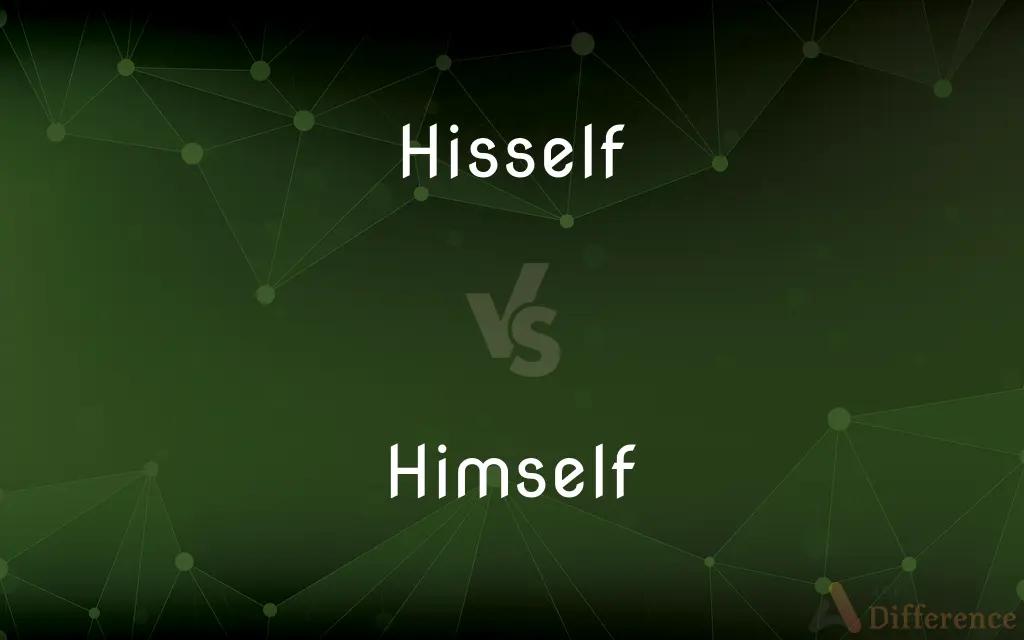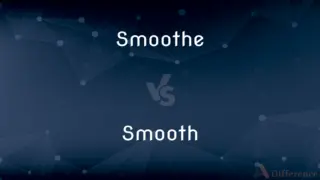Hisself vs. Himself — Which is Correct Spelling?
Edited by Tayyaba Rehman — By Fiza Rafique — Updated on March 20, 2024
Hisself" is incorrect, while "Himself," used for emphasis or to indicate that it is the male subject who performs an action, is correct.

Table of Contents
Which is correct: Hisself or Himself
How to spell Himself?

Hisself
Incorrect Spelling

Himself
Correct Spelling
ADVERTISEMENT
Key Differences
Visualize "Himself" starting with “him” followed by “self.”
Using "hisself" in formal writing or speech is incorrect, remember that formal language uses "himself."
Repeat or write sentences using “himself” to internalize its proper use.
Associate "self" with correct pronouns like "myself," "yourself," and "herself."
Recall “Himself” contains the word “him” which is correct English.
ADVERTISEMENT
How Do You Spell Himself Correctly?
Incorrect: He did the work all by hisself.
Correct: He did the work all by himself.
Incorrect: He should be proud of hisself.
Correct: He should be proud of himself.
Incorrect: He made a cake by hisself for his birthday.
Correct: He made a cake by himself for his birthday.
Incorrect: He bought the gift for hisself.
Correct: He bought the gift for himself.
Incorrect: He needs to learn to trust hisself more.
Correct: He needs to learn to trust himself more.
Himself Definitions
Himself emphasizes the male subject or object.
He himself made the decision.
Himself implies the male subject acted alone.
He did it by himself.
Himself indicates direct involvement or presence.
He spoke to the manager himself.
Himself specifies a particular male individual.
The king himself will visit.
Himself is a reflexive pronoun referring back to the subject.
He injured himself.
(reflexive pronoun) Him; the male object of a verb or preposition that also appears as the subject
He injured himself.
(emphatic) He; used as an intensifier, often to emphasize that the referent is the exclusive participant in the predicate
He was injured himself.
The subject or non-reflexive object of a predicate; he himself.
(Ireland) The subject or non-reflexive object of a predicate; he used of upper-class gentlemen, or sarcastically, of men who imagine themselves to be more important than others
Has himself come down to breakfast yet?
Have you seen himself yet this morning?
An emphasized form of the third person masculine pronoun; - used as a subject usually with he; as, he himself will bear the blame; used alone in the predicate, either in the nominative or objective case; as, it is himself who saved himself.
But he himself returned from the quarries.
David hid himself in the field.
The Lord himself shall give you a sign.
Who gave himself for us, that he might . . . purify unto himself a peculiar people.
With shame remembers, while himself was oneOf the same herd, himself the same had done.
It comprehendeth in himself all good.
One's true or real character; one's natural temper and disposition; the state of being in one's right or sane mind (after unconsciousness, passion, delirium, or abasement); as, the man has come to himself.
Themselves. See Hemself.
Himself Meaning in a Sentence
He often talks to himself when he's concentrating.
He considers himself lucky to have such friends.
He built the shelf all by himself.
He has to prove himself in the new job.
He keeps himself in shape by jogging every day.
He blames himself for the misunderstanding.
He treats himself to a movie every Friday.
He found himself lost in the city.
He cooked dinner for himself and his friends.
He considers himself a bit of a gourmet.
He injured himself while playing soccer.
He bought a new suit for himself.
He taught himself how to play the guitar.
He expressed himself clearly during the meeting.
He challenged himself to run a marathon.
He introduced himself to the new neighbors.
He describes himself as an avid reader.
He sees himself retiring in a few years.
He regards himself as a part of the community.
He made a promise to himself to travel more.
He found himself thinking about the past.
He keeps himself busy with various hobbies.
He surprised himself by winning the race.
He views himself as a responsible person.
He wrote a letter to himself as a reminder.
Himself Idioms & Phrases
By himself
Alone, without assistance.
He likes to work by himself in the quiet.
Beside himself
Extremely upset or excited.
He was beside himself with joy when he heard the news.
A law unto himself
Behaving independently and ignoring rules or conventions.
He's always been a law unto himself, doing things his way.
Come into himself
To become confident and realize one's potential.
He really came into himself during college.
Make a fool of himself
To embarrass oneself through foolish behavior.
He made a fool of himself at the party by drinking too much.
For himself
For his own benefit or use.
He needs to make a name for himself in the industry.
Keep to himself
To be introverted or not socialize much.
He tends to keep to himself, preferring quiet evenings at home.
A man of himself
Self-sufficient and independent.
After years of struggle, he's now a man of himself.
Put himself out there
To make oneself vulnerable, usually in an attempt to achieve something.
He's really putting himself out there with his new business.
Think for himself
To form one's own opinions and decisions.
It's important that he learns to think for himself.
To himself
Kept private or not shared with others.
He always kept his opinions to himself.
Perk himself up
To cheer up or become more lively.
A cup of coffee in the morning helps him perk himself up.
Vouch for himself
To affirm one's own reliability or worth.
He doesn't need anyone to vouch for him; he can vouch for himself.
Pull himself together
To regain control of one's emotions or behavior.
He needed a moment to pull himself together before he could speak.
Set himself apart
To distinguish oneself from others.
He set himself apart with his exceptional dedication.
Throw himself into
To become fully involved in an activity.
He threw himself into his work to avoid thinking about the breakup.
Wrap himself around
To become fully engaged or absorbed in something.
He wrapped himself around the problem until he found a solution.
Outdo himself
To surpass one's previous achievements.
With his latest project, he has truly outdone himself.
To hear himself think
To find quiet or peace in order to concentrate or reflect.
He went for a walk to hear himself think.
Lend himself to
To give one's effort or attention to something.
He's always willing to lend himself to a worthy cause.
Common Curiosities
Why is it called Himself?
It is called "Himself" to reflect actions back onto a male subject.
Which preposition is used with Himself?
"By" can be used with himself (e.g., by himself).
What is the pronunciation of Himself?
Himself is pronounced /hɪmˈsɛlf/.
Which conjunction is used with Himself?
“And” can be used: He and himself (poetically or in reflection).
Which article is used with Himself?
No article is typically used directly before "himself."
Is Himself an abstract noun?
No, it is a pronoun.
Which vowel is used before Himself?
“a” or “the” can be used, depending on context.
Is Himself an adverb?
No, it's not an adverb.
What is the root word of Himself?
The root words are “him” and “self.”
What is the singular form of Himself?
"Himself" is singular.
Is Himself a noun or adjective?
"Himself" is a pronoun.
What is the verb form of Himself?
"Himself" does not have a verb form as it is a pronoun.
Is Himself a negative or positive word?
It is neutral.
Is Himself a countable noun?
No, it is a pronoun.
Is the Himself term a metaphor?
No, but can be used metaphorically.
Which determiner is used with Himself?
No determiner is usually used with "himself."
What is the plural form of Himself?
There is no direct plural, but "themselves" may be used for multiple males.
Is the word Himself is imperative?
No, "himself" is not imperative.
What is a stressed syllable in Himself?
The first syllable is stressed: HIM-self.
What part of speech is Himself?
Pronoun.
What is another term for Himself?
Himself doesn't have a direct synonym but can be replaced depending on context.
What is the first form of Himself?
"Himself" does not have verb forms.
Is Himself a vowel or consonant?
"Himself" is a word, not a vowel or consonant.
Is Himself a collective noun?
No, it is not a collective noun.
Is the word Himself is Gerund?
No, it is a pronoun.
How many syllables are in Himself?
Two syllables.
How do we divide Himself into syllables?
Him-self.
What is the opposite of Himself?
Herself, in gender context.
Is the word “Himself” a Direct object or an Indirect object?
It can serve as a direct object: "He hurt himself."
How is Himself used in a sentence?
Example: He introduced himself to the audience.
What is the second form of Himself?
"Himself" does not have verb forms.
What is the third form of Himself?
"Himself" does not have verb forms.
Share Your Discovery

Previous Comparison
Milage vs. Mileage
Next Comparison
Smoothe vs. SmoothAuthor Spotlight
Written by
Fiza RafiqueFiza Rafique is a skilled content writer at AskDifference.com, where she meticulously refines and enhances written pieces. Drawing from her vast editorial expertise, Fiza ensures clarity, accuracy, and precision in every article. Passionate about language, she continually seeks to elevate the quality of content for readers worldwide.
Edited by
Tayyaba RehmanTayyaba Rehman is a distinguished writer, currently serving as a primary contributor to askdifference.com. As a researcher in semantics and etymology, Tayyaba's passion for the complexity of languages and their distinctions has found a perfect home on the platform. Tayyaba delves into the intricacies of language, distinguishing between commonly confused words and phrases, thereby providing clarity for readers worldwide.














































